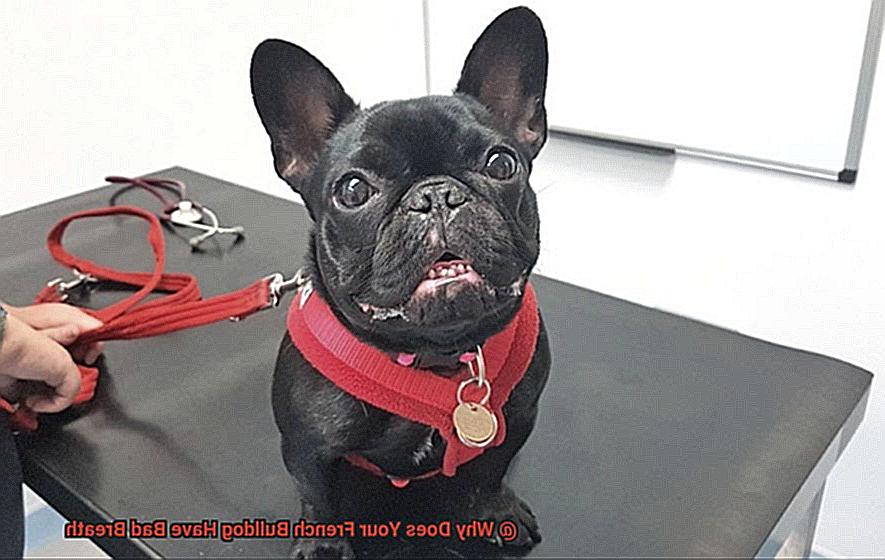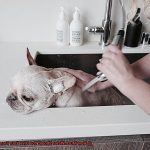Why Does Your French Bulldog Have Bad Breath?
Do you find yourself holding your nose when your French Bulldog tries to give you a kiss?
Don’t worry; you’re not alone in dealing with this stinky situation. As common as it may be, bad breath can actually be an indicator of a more significant health problem for your furry friend.
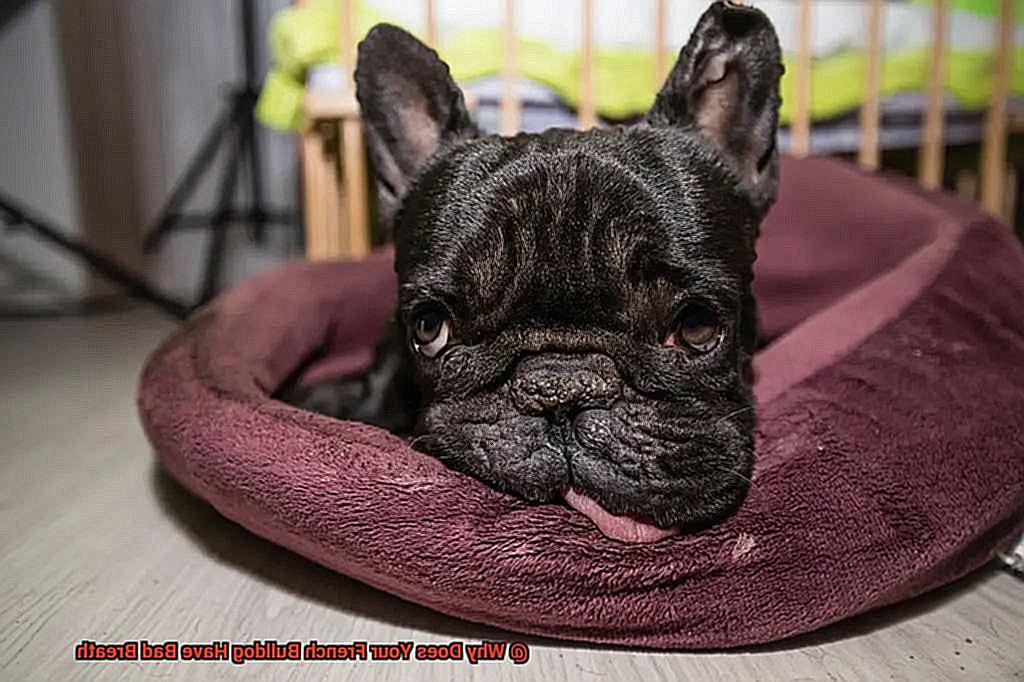
As a devoted pet owner, it’s crucial to understand the root causes of your French Bulldog’s unpleasant odor. From poor dental hygiene to dietary habits, there are several factors that could contribute to their smelly breath.
In this article, we’ll dive into the primary reasons behind bad breath in French Bulldogs and provide you with practical tips on how to prevent and address this issue. Whether you’re a seasoned Frenchie owner or a first-time parent, you won’t want to miss out on this essential information.
We’ll show you how to keep your pup’s breath smelling fresh and clean so that they can continue showering you with love without making your eyes water.

Poor Dental Hygiene as a Cause of Bad Breath in French Bulldogs
Contents
- 1 Poor Dental Hygiene as a Cause of Bad Breath in French Bulldogs
- 2 Diet as a Cause of Bad Breath in French Bulldogs
- 3 Underlying Health Issues That Can Cause Bad Breath in French Bulldogs
- 4 Regular Brushing to Improve Your Dog’s Oral Hygiene
- 5 High-Quality Dog Food for Improved Oral Health
- 6 Dental Treats and Chews to Freshen Your Dog’s Breath
- 7 Conclusion
However, bad breath in French bulldogs can be more than just an annoyance – it can also signal a potentially serious dental issue.
One of the most common culprits behind bad breath in French bulldogs is poor dental hygiene. With their short snouts and crowded teeth, Frenchies are especially susceptible to dental problems that can lead to bad breath and even tooth loss if left untreated.
To combat this, it’s crucial to establish a regular dental care routine for your pup. Daily teeth brushing with a dog-specific toothpaste and toothbrush is a must, as is scheduling regular professional cleanings with your veterinarian.
By taking these steps, you can prevent the buildup of bacteria, plaque, and tartar that cause both bad breath and more serious dental issues. In addition to dental hygiene, diet also plays a role in your French bulldog’s oral health.
Table scraps and sugary treats can contribute to plaque buildup and tooth decay, so opt instead for a high-quality dog food that promotes good oral hygiene. Dental treats and chews can also help clean teeth and freshen breath.
Bad breath may be a symptom of an underlying health issue such as kidney disease or diabetes.
Diet as a Cause of Bad Breath in French Bulldogs
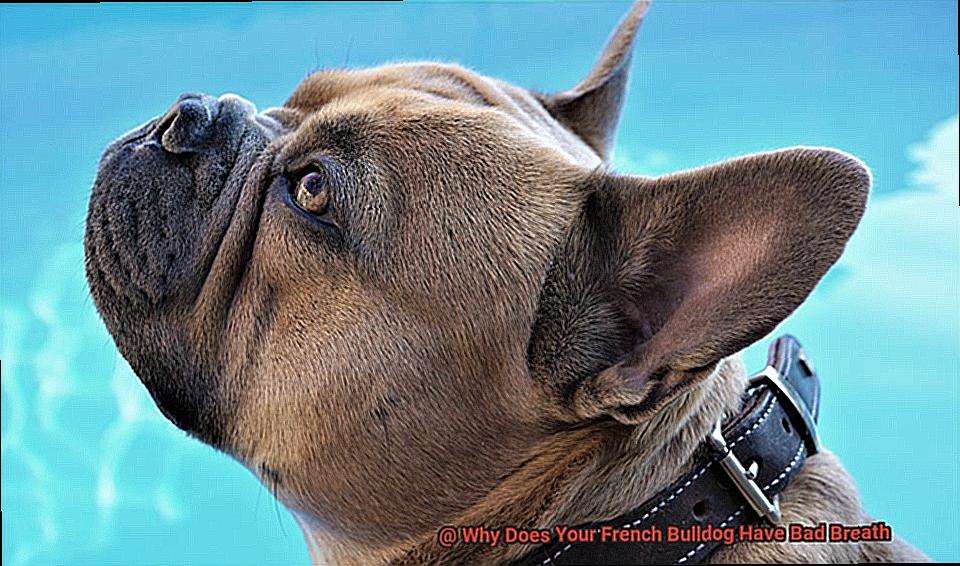
While it may seem like a minor issue, it could be an indication of serious dental problems that can impact your French bulldog’s overall health.
In this article, we will explore how diet can be a significant factor in causing bad breath in French bulldogs. First and foremost, it is crucial to understand that your French bulldog’s diet plays a significant role in their overall well-being, including their oral hygiene.
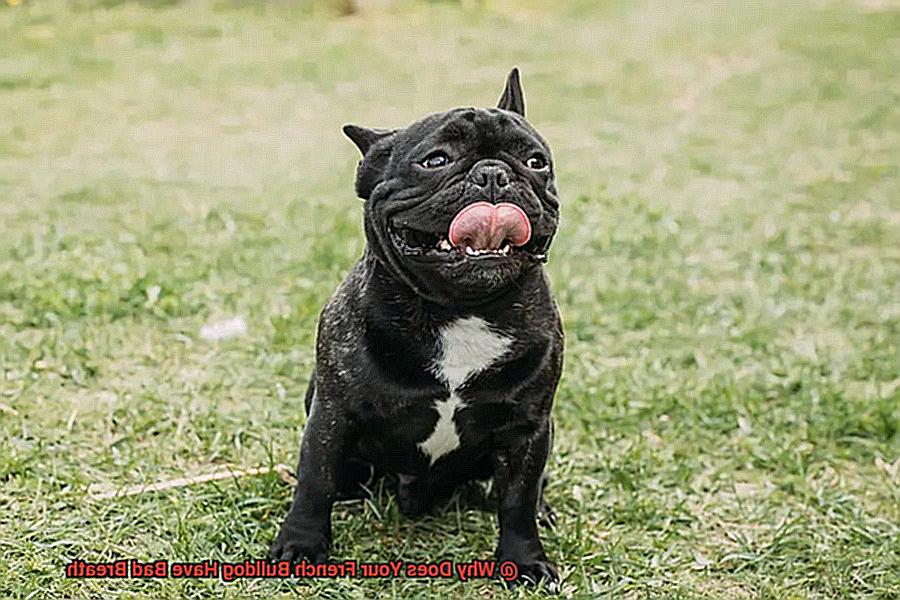
Feeding your four-legged friend inappropriate food may lead to bad breath. Foods that are high in sugar and carbohydrates can cause an overgrowth of bacteria in the mouth, which leads to bad breath.
The breakdown of sugary substances by bacteria results in an unpleasant odor. Moreover, many commercial dog foods contain fillers, artificial preservatives, and flavorings that are not only unhealthy but can also cause bad breath.
These additives can also cause tooth decay and gum disease, leading to halitosis. Additionally, some French bulldogs have sensitivities or allergies to certain food ingredients.
These sensitivities may cause digestive problems that result in bad breath. Therefore, it is vital to feed your French bulldog high-quality dog food that contains natural ingredients and is free from artificial preservatives or fillers.
It is crucial to monitor your French bulldog’s diet carefully. Avoid feeding them table scraps, sugary treats, or human food.
Instead, opt for high-quality dog food specifically designed for your pet’s nutritional needs. You may also offer them healthy treats such as carrots or apple slices to help keep their teeth clean and freshen their breath.
Feeding them with healthy food free from artificial preservatives and fillers and monitoring their food intake can help prevent halitosis and other dental problems.
Underlying Health Issues That Can Cause Bad Breath in French Bulldogs
French Bulldogs are an absolute delight to have around; they’re affectionate, friendly and make the perfect companions.
However, bad breath in French Bulldogs can be a sign of an underlying health issue that requires attention. As an expert in this area, I have researched several health issues that can cause bad breath in French Bulldogs.
One of the most common underlying health issues that can cause bad breath is periodontal disease. This condition is caused by a buildup of plaque and tartar on your dog’s teeth, which leads to inflammation and infection of the gums.
If left untreated, periodontal disease can lead to tooth loss and even damage other organs in the body, such as the heart and kidneys. Therefore, it is crucial to take care of your dog’s dental hygiene and seek veterinary care if you notice persistent bad breath.
Gastrointestinal issues can also result in unpleasant breath in French Bulldogs. A digestive problem or infection in your dog’s stomach or intestines can produce a foul odor.
Additionally, kidney or liver disease can affect the way your dog’s body metabolizes protein and produce waste products that cause bad breath. Respiratory infections can also lead to bad breath in French Bulldogs.
Sinus infections and other respiratory problems can result in a foul-smelling breath along with coughing, sneezing, and other respiratory symptoms. If you notice any of these signs, it is essential to seek veterinary care promptly.
It is important to emphasize that bad breath in French Bulldogs should not be ignored as it could indicate an underlying health issue. Early detection and treatment of underlying health issues can help prevent further complications and ensure your furry friend stays healthy and happy.
Remember to keep your pup healthy by taking care of their dental hygiene and overall health. In conclusion, being aware of the underlying health issues that can cause bad breath in French Bulldogs is vital for pet owners.
Regular Brushing to Improve Your Dog’s Oral Hygiene
One of the most crucial aspects of their well-being is maintaining good oral hygiene, and regular brushing is a fundamental component of this.
To prevent the build-up of plaque and tartar that can cause bad breath and more serious health problems down the line, it’s recommended to brush your French bulldog’s teeth daily or at least three times a week. Use a soft-bristled toothbrush and dog-specific toothpaste, as human toothpaste contains fluoride that can be toxic to dogs.
When brushing your pup’s teeth, focus on their back teeth where plaque and tartar tend to accumulate. Gently use circular motions while making sure to be patient and calm throughout the process.
To supplement this routine, incorporate dental chews and toys into their routine to clean their teeth and freshen their breath. Introducing the brushing process gradually is vital, as some dogs may resist having their teeth brushed.
Let your furry friend sniff the toothbrush and toothpaste first, rewarding them with praise and treats when they show interest in the items. This positive experience will help make brushing more enjoyable for them.
Professional dental cleanings are also an excellent way to maintain optimal oral health for your French bulldog. Consider scheduling these cleanings once or twice a year to supplement your regular brushing routine.
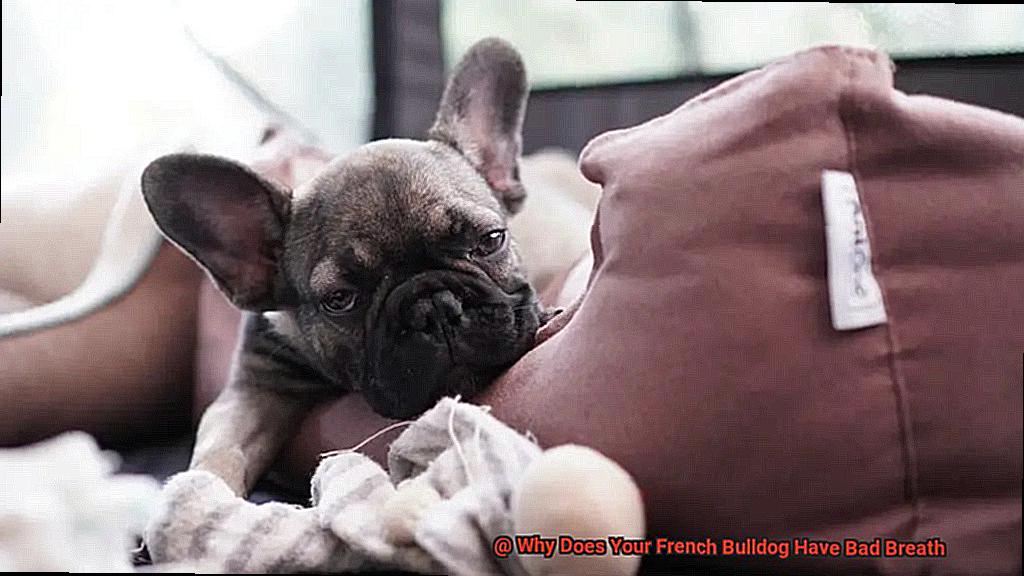
High-Quality Dog Food for Improved Oral Health
One key aspect of their wellbeing is their oral hygiene, which can impact their overall health and happiness.
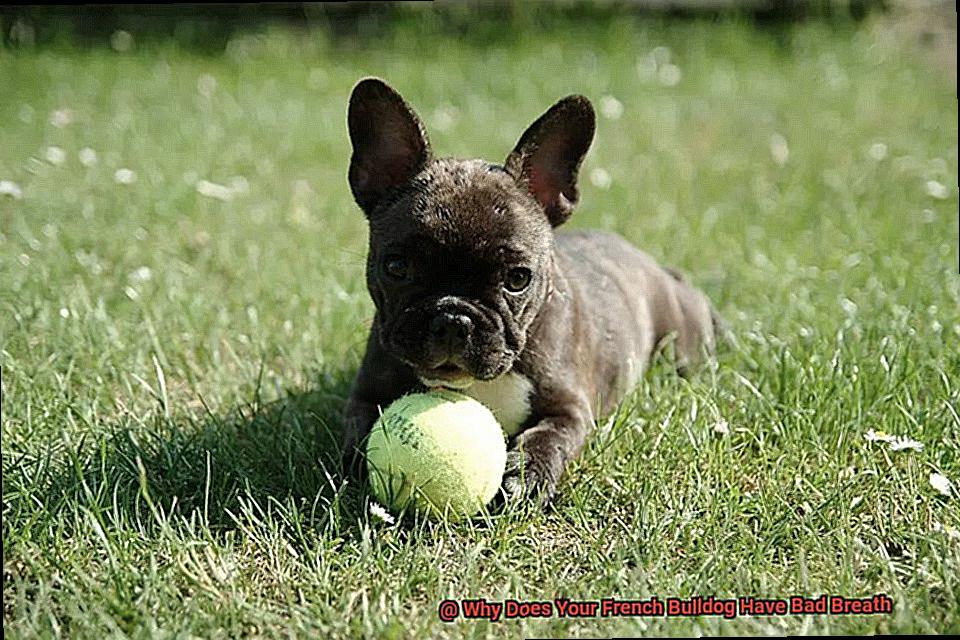
Did you know that the type of food they consume can also play a significant role in their dental health? In this article, we will explore how you can choose high-quality dog food that can improve your French Bulldog’s oral health.
When selecting a dog food for your French Bulldog, it’s essential to look at the ingredients list. The first ingredient should be a high-quality source of protein, such as meat or fish.
These proteins provide essential amino acids for muscle growth and maintenance, crucial for your dog’s wellbeing. A balanced amount of vitamins and minerals is also necessary to support overall health.
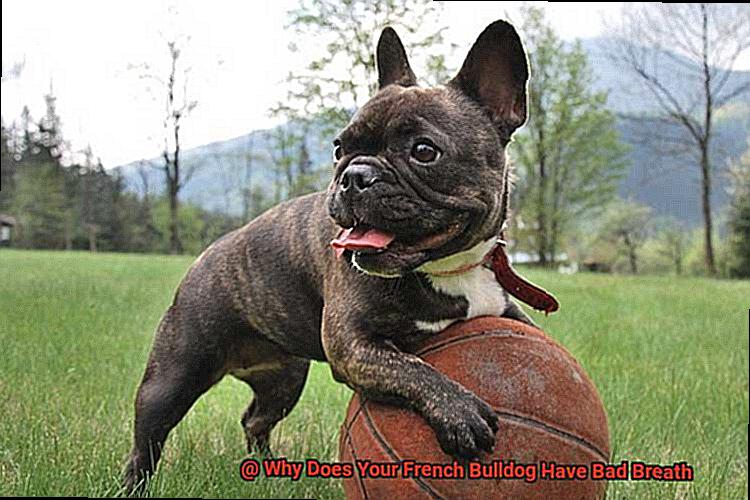
Antioxidants like vitamin E and vitamin C can help prevent gum disease and inflammation. Look for dog foods that contain these essential nutrients.
Some dog foods are specially formulated to promote dental health. They contain ingredients that reduce plaque buildup and freshen breath.
For example, sodium hexametaphosphate is an ingredient that binds to calcium in the mouth to prevent tartar buildup. Other dog foods may contain enzymes that break down plaque and reduce the risk of gum disease.
However, not all high-quality dog foods are created equal. Some brands may claim to be “premium” or “natural” but still include low-quality ingredients that can contribute to bad breath and poor oral health.
It’s critical to research and choose a reputable brand that uses high-quality ingredients. Feeding your French Bulldog a high-quality dog food is just one step towards optimal oral health.
Regular teeth brushing and providing dental chews or toys can also help clean their teeth and prevent plaque buildup. In conclusion, selecting a high-quality dog food specifically formulated for dental health can improve your French Bulldog’s oral hygiene and reduce bad breath.
9BlEBcKPkmQ” >
Dental Treats and Chews to Freshen Your Dog’s Breath
Dental treats and chews can be a great way to achieve this goal.
These treats work by removing plaque and tartar buildup from your dog’s teeth and gums, which can be a major source of bad breath. When selecting dental treats for your French Bulldog, it’s important to consider both the size and ingredients of the treat.
For example, larger dogs may require larger chews, while smaller dogs benefit from smaller, softer treats. This is because larger chews can be difficult for smaller dogs to handle and may even pose a choking hazard.
Similarly, smaller treats may not provide enough chewing resistance for larger dogs, which means they won’t work as effectively to clean their teeth. In addition to size, it’s also important to pay attention to the ingredients in the dental treats you choose.
Look for treats that are low in fat and sugar and free from artificial colors and flavors. Some dental chews even contain added ingredients like chlorophyll or parsley to further freshen your dog’s breath.
These natural ingredients can be particularly helpful if your French Bulldog has persistent bad breath. However, it’s important to remember that dental treats and chews should not replace regular brushing and professional dental cleanings.
These treats should be used in conjunction with regular brushing to maintain optimal oral health for your pet. Your veterinarian can recommend a brushing schedule that works best for your French Bulldog’s individual needs.
In conclusion, dental treats and chews can be a great way to freshen your French Bulldog’s breath and promote their oral health. By considering both the size and ingredients of the treat, you can provide the best possible care for your furry friend’s teeth and gums.
Also Read: What to Do If Your French Bulldog Has Bad Breath?
Conclusion
In conclusion, it’s important to remember that bad breath in French Bulldogs can be a sign of underlying health issues.
As a responsible pet owner, it’s crucial to take proactive steps to prevent and address this problem. The primary culprits behind bad breath in Frenchies are poor dental hygiene, inappropriate diet, and underlying health issues.
Combatting these issues starts with establishing a regular dental care routine for your pup that includes daily teeth brushing with dog-specific toothpaste and toothbrushes. You should also schedule regular professional cleanings with your veterinarian.
To promote good oral hygiene, opt for high-quality dog food and avoid sugary treats or human food. Additionally, early detection and treatment of underlying health issues such as periodontal disease, gastrointestinal issues, kidney or liver disease, or respiratory infections is crucial for your furry friend’s overall well-being.
Regular brushing with soft-bristled toothbrushes and dog-specific toothpaste along with incorporating dental chews and toys into their routine can help maintain optimal oral health. Choosing high-quality dog food specifically formulated for dental health can also improve their oral hygiene.
They can be used in conjunction with regular brushing to freshen your pup’s breath while promoting their oral health.
